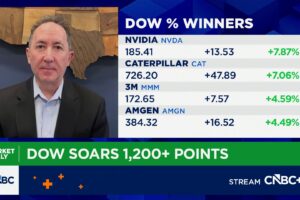
(Bloomberg Opinion) — Going in to Facebook Inc.’s earnings on Wednesday, investors were braced for bad news — specifically, that advertising revenue had dried up as the shutdowns caused by the coronavirus pandemic forced customers to pull back on spending. Instead, they got a surprise. The social-media giant reported better-than-expected first-quarter financial results and gave an update for its business so far in April that was better than feared.
Facebook posted earnings per share of $1.71, in line with the Bloomberg consensus, while generating $17.74 billion of revenue in the quarter, slightly higher than the $17.27 billion average analyst estimate. Even more important, Facebook said that while it did experience a “steep decrease” in its ad sales last month, it saw “signs of stability” during the first few weeks April, with ad revenue about flat versus the prior year. Facebook management added on the earnings call they also saw relative strength from the company’s gaming, technology and e-commerce segments as those clients took advantage of lower ad prices. The stock rose about 9% in post-market trading following the commentary.
As encouraging as this news was, the reality is that the internet ad recession sparked by the Covid-19 pandemic is likely only just beginning. Even management seemed to caution the environment may get worse. Facebook CEO Mark Zuckerberg said the economic fallout from the coronavirus may last longer than people anticipate. The company’s CFO David Wehner also added the ad industry contraction could be more severe going forward. Consequently, Facebook didn’t provide any guidance for the second quarter and full year.
But while many analysts and investors were laser-focused on the current trajectory of Facebook’s ad business and how long a downturn is going to last, they should also keep an eye on the dramatic changes occurring in the current digital landscape. Netflix Inc. CEO Reed Hastings has famously said he considered the streaming-video company’s true competition to be the other ways consumers spend their time, specifically citing activities such as sleep and the game Fortnite. So where are people spending their time now?
One easy way to find out is to look at the most popular apps in Apple Inc.’s App Store. Video platform TikTok has been ranked first or second for much of this year, while Zoom Video Communications Inc.’s video-conferencing app has taken hold of the No. 1 spot since mid-March. Both apps are several places ahead of Facebook’s major apps such as Instagram, Messenger and Facebook, pointing to their rising relative engagement.
This certainly has Zuckerberg’s attention. In the past, the executive has been prescient in acquiring companies with apps that were getting traction with users. For example, Facebook bought Instagram in 2012 for about $1 billion. Moreover, it purchased WhatsApp for $19 billion in 2014 and reportedly even tried to acquire Snap. In the current environment, where Facebook is facing antitrust scrutiny for its previous deals, purchasing the next rising star probably isn’t an option.
While TikTok has been popular over the past year as the viral short-video platform of choice, the story of the moment is the parabolic rise of video-conferencing pure-play Zoom. The company announced last week it surpassed 300 million daily participants, up from 200 million in March and 10 million at the end of last year.
And Zoom’s parabolic rise is unprecedented. Earlier this month, veteran internet analyst Mary Meeker said the company had a faster ramp than either Instagram or Fortnite, both of which took 2 years and 18 months, respectively, to reach 100 million users. Zoom achieved that milestone in less than three months. With hundreds of million people — young and old — now spending hours a day on Zoom, it threatens all the tech giants. Google, Microsoft Corp. and Facebook have all frantically announced new Zoom-like video-conferencing features over the past month for their competing-services, hoping to catch some of the magic. But it may be too late for the goliaths. Historically, when a best-of-breed category winner reaches a certain momentum, it isn’t easily dislodged.
And the biggest signal that Facebook may be worried? Last Friday, Zuckerberg did several one-on-one interviews with major media outlets to announce the roll-out of its latest Zoom-competing feature Messenger Rooms. The fact he’s going out of his way to promote it shows how seriously he is thinking about Zoom. As for ad revenue? It’s a sure thing he’s thinking about that, too.
This column does not necessarily reflect the opinion of the editorial board or Bloomberg LP and its owners.
Tae Kim is a Bloomberg Opinion columnist covering technology. He previously covered technology for Barron’s, following an earlier career as an equity analyst.
<p class="canvas-atom canvas-text Mb(1.0em) Mb(0)–sm Mt(0.8em)–sm" type="text" content="For more articles like this, please visit us at bloomberg.com/opinion” data-reactid=”27″>For more articles like this, please visit us at bloomberg.com/opinion
<p class="canvas-atom canvas-text Mb(1.0em) Mb(0)–sm Mt(0.8em)–sm" type="text" content="Subscribe now to stay ahead with the most trusted business news source.” data-reactid=”28″>Subscribe now to stay ahead with the most trusted business news source.
©2020 Bloomberg L.P.









